'We Don't Have to Be Assholes About It': Mayor Peter Buttigieg Talks 2020 With Esquire
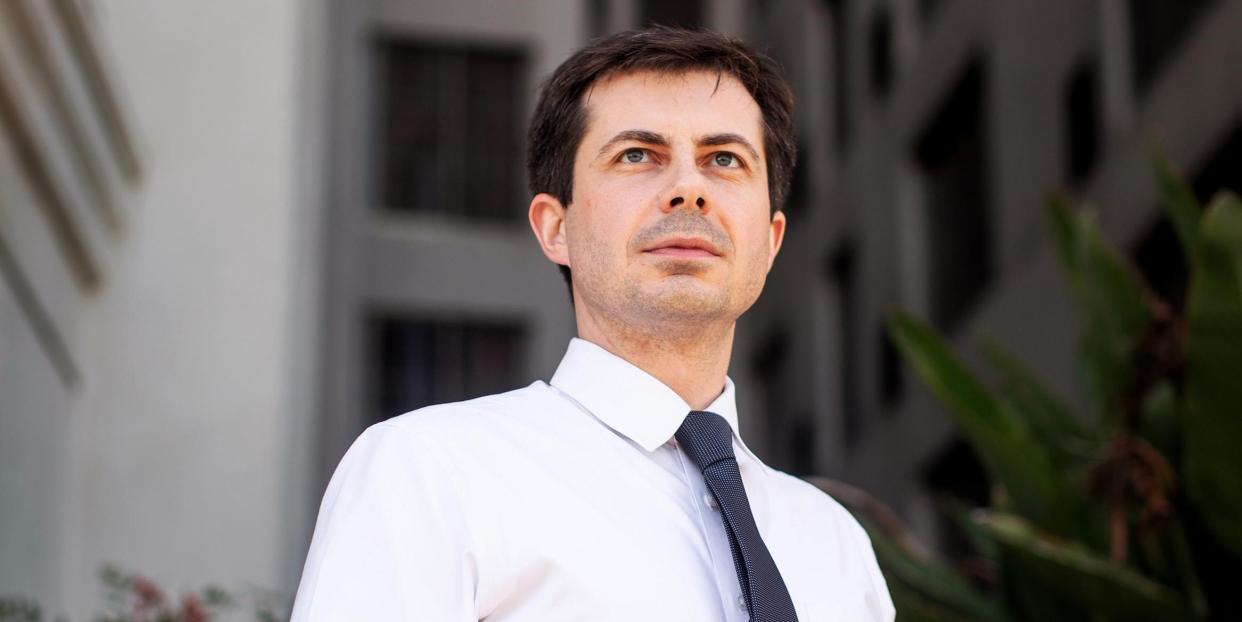
Like seemingly every other Democrat in or out of office, Peter Buttigieg, the 37-year-old mayor of South Bend, Indiana, is running for president. A week ago Buttigieg-it’s pronounced like “Buddha-jidge,” but everyone calls him Mayor Pete-had a breakout moment during a CNN forum when he was asked about Mike Pence.
“Please don’t judge my state by our former governor,” he said, before making eloquent comments about offering grace to older Americans who fought against marriage equality, what scripture has taught him, and how baffled he was that Pence had become “the cheerleader of the porn star presidency.”
Since then, interest in Buttegieg has skyrocketed and he has qualified to be on stage for the Democratic debates. I caught up with him on the phone while he was fundraising in Los Angeles last Friday. This conversation has been edited and condensed for clarity.
Ryan Lizza: In 2000, while in high school, you won a national essay contest, and the subject of your essay was the bravery of Bernie Sanders' running for congress as a socialist. Are you a socialist or a capitalist?
Peter Buttigieg: I believe in capitalism as long as there's a strong rule of law around it. We're dealing with a whole [older] generation that was really shaped by a Cold War environment where socialism was treated as the same thing as communism. And the opposite of that was democracy and capitalism. So to be for socialism was to be for communism and against democracy and capitalism. Now you see how these things are really shaking loose from each other in a lot of ways. They've become unbundled. The big question is what you prioritize, and I prioritize democracy. People are trying to make sense of the distance between socialism in Canada, say, and Denmark versus Venezuela. And the answer is democracy.
What did you admire about Sanders back then when you were in high school?
The fact that he said what he was for. It was that moment, coming out of the late nineties, when it felt like there was a lot of opportunistic sensibility by politicians around what they believe, even more than usual. So it was really intriguing to see somebody like him who embraced this label which could have been political suicide.
When you were in high school in the nineties, were you turned off by Bill Clinton because of his third way, centrist approach to politics?
Yeah, I definitely grew up in a family that was skeptical of that. There was progress overall in the economy, but I think that period also laid the groundwork for where we are now, where we've gotten tremendous growth in the economy and tremendous growth in economic inequality. I think it was also just a function of living in a very conservative era, when even Democrats, when elected, were compelled to do conservative things.
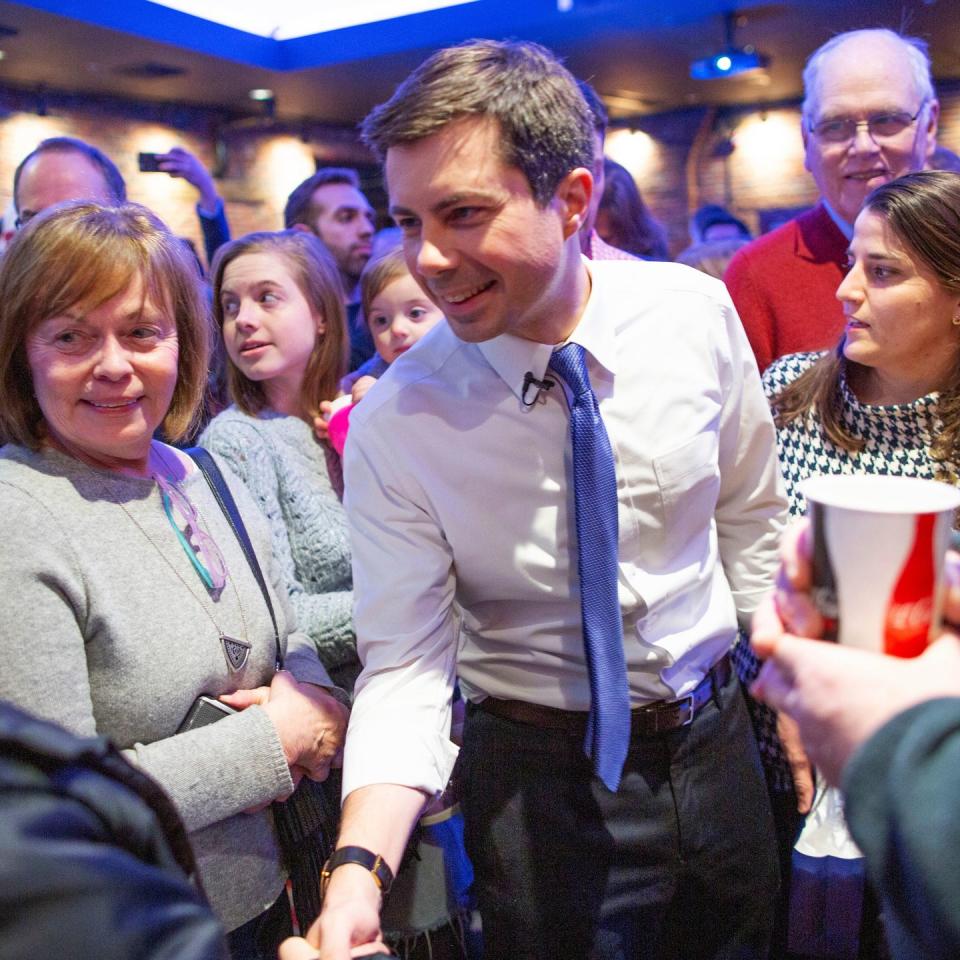
Would you support reparations to compensate for America's history of slavery?
I've never seen a specific, workable proposal. But what I do think is convincing is the idea that we have to be intentional about addressing or reversing harms and inequities that didn't just happen on their own. The cleanest way I can think of to do it are through policies. So we know in housing and criminal justice, to some extent in basic economic policies around wages and taxation, that some policy improvements that are also the right thing to do will have a disproportionate benefit to people of color. I think that's one way that we can be intentional and make a difference on this. I've just not seen a cash transfer mechanism that’s been laid out that you can envision working that most people would think is fair.
Do you agree with Elizabeth Warren that we should break up some of the tech giants?
Yeah, potentially. I think what's important is for us to consider two things that are related but different. One is possible monopolistic behavior. So when you see companies acquiring other companies and basically using domination of one market to dominate another. That's problematic, and I think that in some cases it may call for anti-trust action. I'm actually as concerned, and maybe more concerned, about what these companies do and how they behave when it comes to things like data security and data privacy. Curing the size issue is not really enough to deal with these privacy issues.
What's the single best plank in the congressional version of the Green New Deal and the single worst plank?
To me what's really important about the Green New Deal isn't like one of the elements of it, it's the concept. It’s the concept that we have a national emergency commensurate with a depression or a war. And then the second part of it, the concept that, in rising to meet that challenge, there's a ton of economic opportunity. To me, that's what's really appealing about it. Also, the Green New Deal today is a set of goals, not a fully articulated plan. Which is fine.
Obviously some of the rhetoric around the Green New Deal has gotten a little silly about farting cows and abolishing airplanes, and that sort of thing. But fundamentally I think it’s a sound framework, and it creates the right sense of urgency in that we can kind of luxuriate in a debate over what the right gear might be to do carbon targets, but scientifically the right time to do it was yesterday.
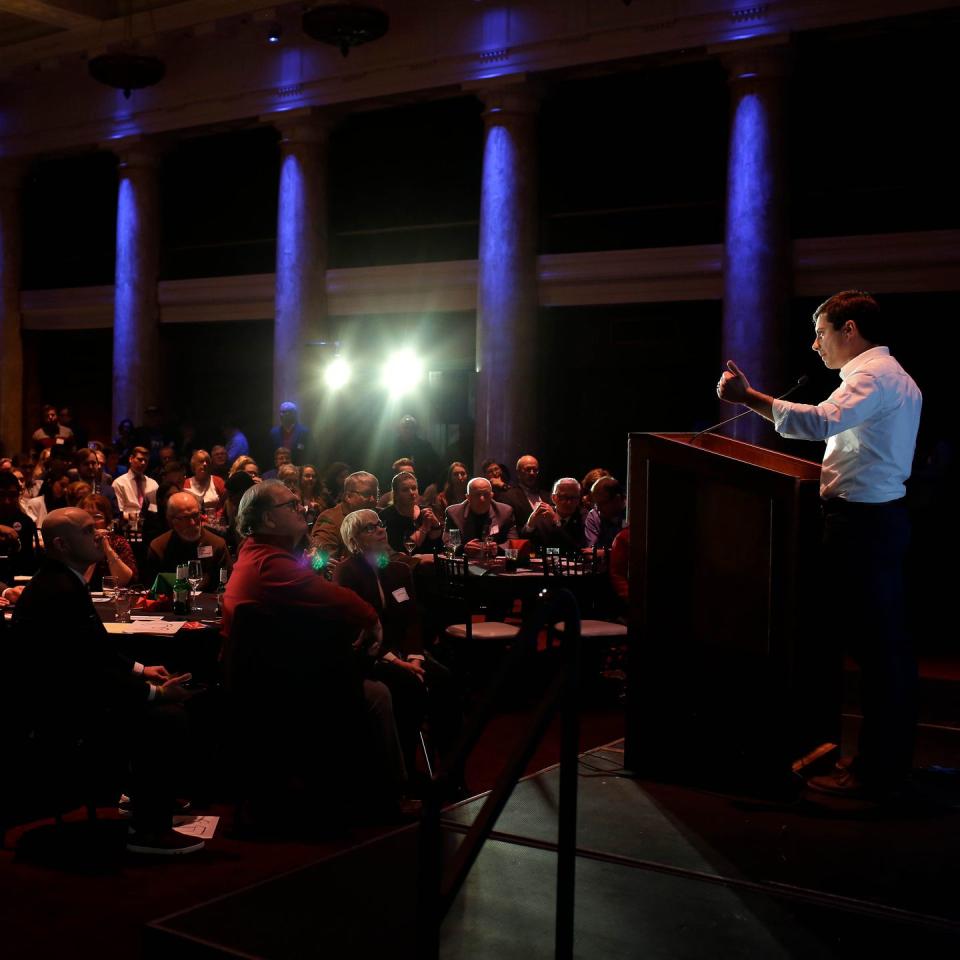
In looking at ways to do Medicare for All there are two big options. One is to-for lack of a better word-force everyone into Medicare. The other is to create it as an option where the goal would be that everyone would choose it over time. You're in the latter camp. What made you choose that path?
As a mayor, my instinct is to really think about how to get something done and not to make the promise unless you have some view of the pathway. You don't have to have it all figured out, but you have to have a pathway there. And when we're talking about this big part of the American economy, and we were thinking about what's at stake, I think any politician who lets the phrase “Medicare for All” escape their lips also has to have some account of how you get from point A to point B.
And to me the public option is the way to do it. I've been calling it "Medicare for all who want it." What you're doing is taking a version of Medicare and you're putting it out there, and then if people like me are right, then it will be not only a benefit in terms of getting more people covered, but also being more efficient and cost effective than the corporate patchwork system we have today. Then this should prove to be a very natural glide path to single payer as more and more people buy in.
One of the hallmarks of the campaign so far has been a really rich and detailed debate about policy within the Democratic Party. Is that what's important right now? Or should the Democratic Party simply be organized around the simple premise that Donald Trump is a national emergency and must be defeated above all else and that the policy particulars should take a back seat to that?
So actually I don't agree with either of those approaches. The problem with making it all about him is that's what we did in 2016, and when we make it all about him, then there's a lot of voters in places like the industrial midwest, where I live, who say, "Okay, but who's talking about me?" Part of how we lost our way in 2016 was, first of all, it was all about our own nominee. "I'm with her," was literally the button.
Then when we realized who the Republican nominee was going to be, the message became, "Don't vote for him." And we just left a lot of people out because it didn't seem like we were talking about the lived experience of Americans.
For the same reason I don't think that we should do the usual Democratic thing, which is experiencing your competition through competing policy proposals. I think that policy matters, I'm a policy guy. But I think that you need our altitude to be both higher and lower. Higher in the sense that I think we need to talk about values and principles, that's why I'm out there talking about what freedom and democracy and security mean before we get into the depth of any policy idea. And at the same time also be talking in terms that are nearer to the ground, really explaining what we believe in in terms of everyday lived experience and how different under us it will be than under them. And that's how good political narrative works.
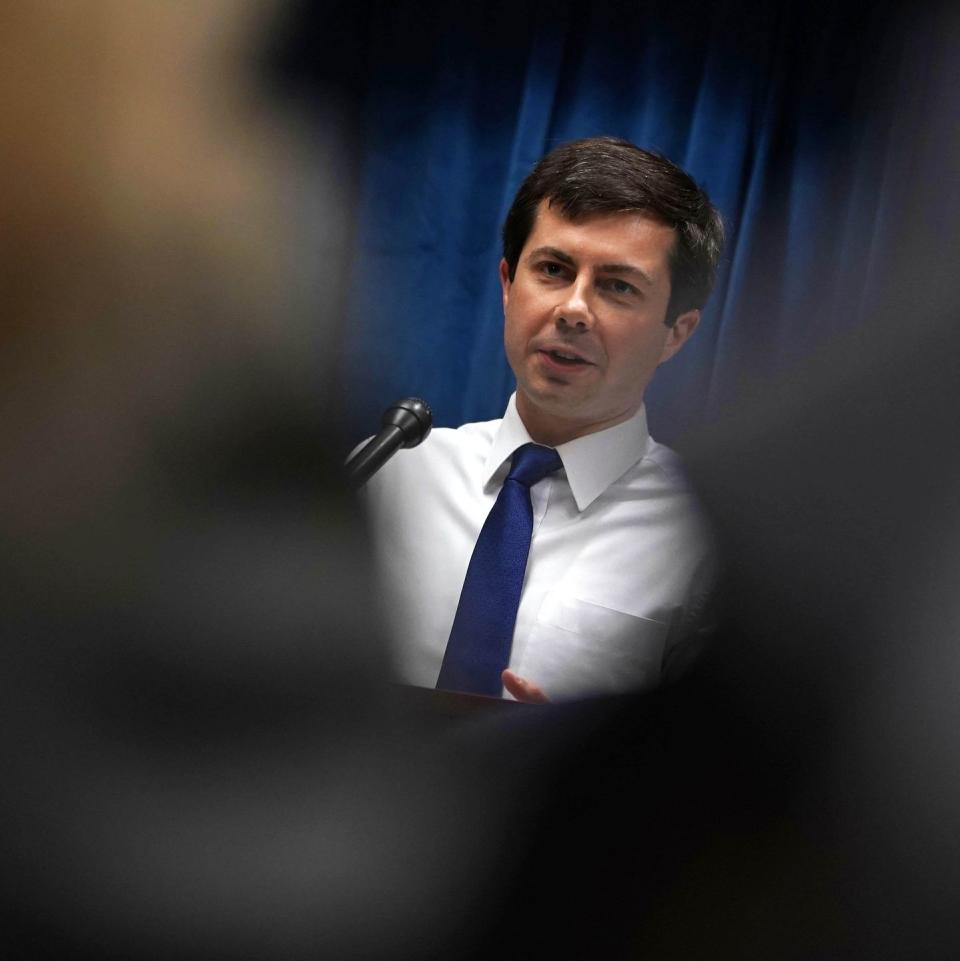
The House recently voted on reducing the voting age to 16 years old. It didn't end up being part of the bill that passed but, would you support that?
I'm not sure about that. I think it's a worthwhile debate, just because any number is a little arbitrary and moving it from 21 to 18 served us pretty well. That being said, there are some things that happen when you're 18 that make you a fully vested citizen in ways that are not the case yet at 16, especially the fact that you are vulnerable to potentially being called up to serve.
By the way we just got the word that senator Birch Bayh passed away. [Editor’s note: Bayh, a senator from Indiana, drafted the constitutional amendment that lowered the voting age from 21 to 18.]
Did he have any impact on you growing up as a fellow Hoosier?
He was already out of office by the time I came of age but we’d see him campaigning for other people around Indiana. He was famous for carrying a spoon in his suit pocket to be ready for stops at Dairy Queen. He had that kind of nice retail touch. But also -
If only Amy Klobuchar had adopted a version of that.
Eeeeeeewww, uh, yeah.
I will note the non-response to that.
It shows that there's nothing kind of wild-eyed or exotic about updating our constitution. He was as level-headed and common-sensical a political figure as you'll see. And offered all kinds of constitutional amendments. Title IX was a consequence of realizing that the Equal Rights Amendment wasn’t going to pass. He tried to do away with the Electoral College and then he also successfully authored the 25th Amendment [presidential succession and disability] and the change in voting age [the 26th Amendment].
It’s a reminder that now we've become accustomed to tinkering but just one political lifetime ago, we knew that part of shoring up our democracy was tuning up our Constitution with amendments.
What's a major national issue about which you've completely changed your mind since you entered politics?
When you actually go to the Middle East, you come away with more questions than answers.
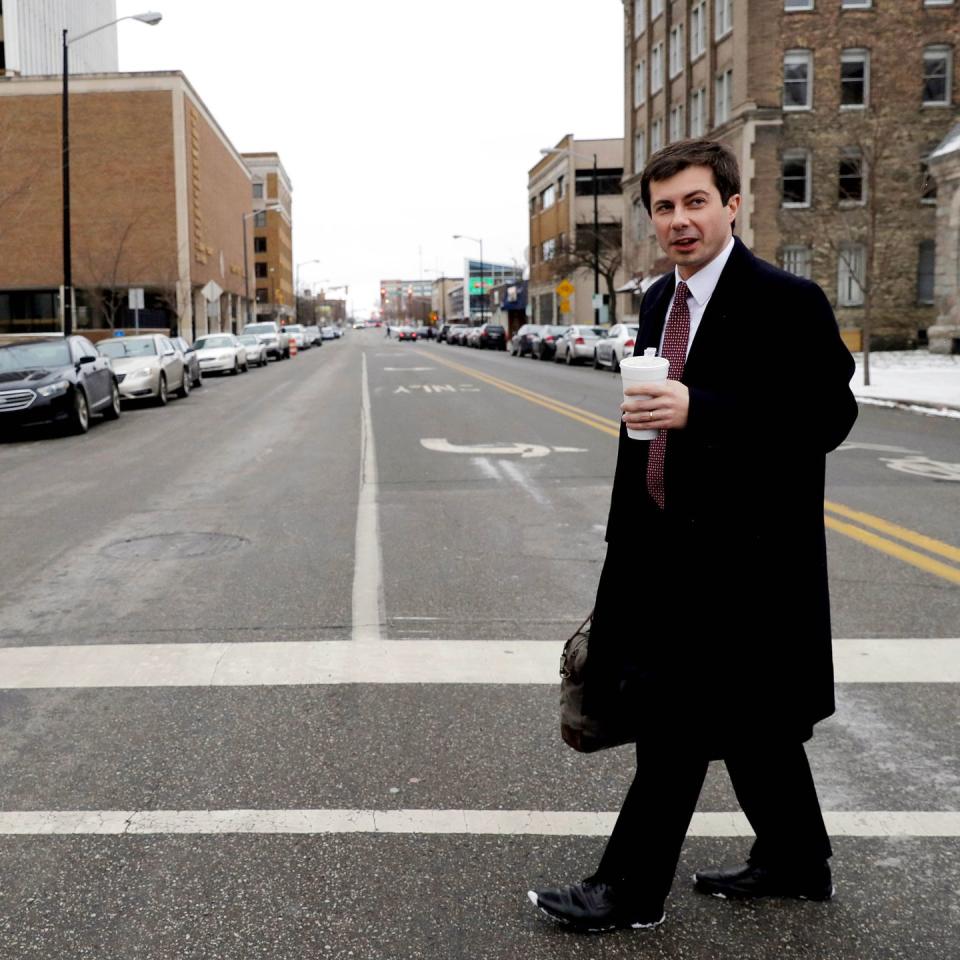
So when you went to the Middle East which way were you leaning and how was it adjusted?
I just saw more of the complexity there. So, on one hand, really marveling at the achievements that have taken place in Israeli society. And on the other hand, seeing the extent to which no one can explain how you can have a democracy and a Jewish state at the same time unless there's a two-state solution. And some of these other things that just cannot continue the way they're going. Seeing it just kind of gave me a richer sense of it. I've noticed that often at home, the folks who have the most strident answers are people who have less of a connection to the place.
I guess I experienced that in the military too. [Editor’s note: Buttigieg served in Afghanistan as a naval reservist.] People in the military actually have very complicated feelings about war and peace, something that I think is not something people really associate with being in the military.
Is there anything that is considered a conservative idea that you wish Democrats owned?
A big part of my political vocabulary is about this because I think Democrats should own freedom. I think conservatives have gotten hung up on this very narrow view of freedom because they've forgotten that the government's not the only thing that can make you unfree. And that's why I talk about access to healthcare as a source of freedom. I remind everybody that freedom to marry is a pretty important one that matters more for a lot of us in our lives than freedom from this or that obscure regulation. And I think if we succeed people will understand freedom as something that is secured by good government, just as much as it is damaged by bad government.
On the flip side, is there anything that is considered right now a progressive idea and that the Democrats are associated with that you wish the Democrats would ditch?
I think a lot of it is tonal. You just gotta make sure that even as we demonstrate we can fight those in power right now-stand up to them and reject everything that's wrong and correct everything that's false-but we don't have to be assholes about it.
Is there anything approaching a Buttigieg doctrine when it comes to the use of force abroad?
I guess the way I'd put it is that anything we do should be, one, grounded in core American interests. Two, vetted against American values. And three, consulted on with American allies whenever we responsibly can do that. Another way to put it simply is the bar ought to be higher.
To make it concrete, what are the interventions since you've been alive and paying attention to politics that you supported?
Well, I think we had to act after 9/11 and so the authorization for use of military force in Afghanistan made sense, to a point. I think the open-ended commitment did not. Obviously I believe the Iraq War was a colossal mistake and I'm very concerned now to saber-rattling around Venezuela.

What about Libya, would that have met the Buttigieg test?
I don't think that core American interests-that it really showed that American lives should be put on the line. I didn't see that threshold met.
You're a big James Joyce buff. Is running for president more like Ulyssesor Finnegan's or Wake?
Definitely more like Ulysses than it is like Portrait. Finnegan's Wake is dream speak. Ulysses is consciousness meeting reality. But here's why I think Ulysses is extremely relevant. People believe Ulysses is this complex, difficult, inscrutable text full of references. And it is a difficult text, but its subject matter couldn't be more democratic. It's about a guy going about his day for one day. That's the plot of Ulysses. And, to me, that's what makes it very touching. You're in this guy's head, and you're kind of seeing life through his eyes, and at the end through his wife's eyes.
That's how politics ought to be, too. The reason any of this stuff matters is that it affects us in the everyday. And I think the greatest literature, whether it's Ulysses or Mahfouz, when it touches politics, it's about how politics can make our everyday better or worse. And I think that same understanding of the imperative and the primacy of lived experience ought to be how our politics works.
('You Might Also Like',)

